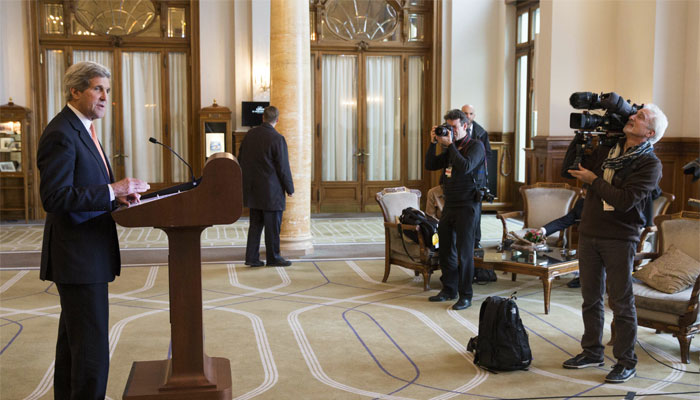US Secretary of State John Kerry delivers remarks at the conclusion of another round of nuclear negotiations with Iranian Foreign Minister Mohammad Javad Zarif
AFP/ Montreux
The United States said Wednesday tough challenges remained to seal a nuclear deal with Iran, vowing not to be distracted by external politics in its quest to stop Tehran acquiring the atomic bomb.
Secretary of State John Kerry and his Iranian counterpart Mohammad Javad Zarif wrapped up three days of "intense" nuclear negotiations in the Swiss lakeside town of Montreux with still no deal, as a March 31 deadline for a framework agreement looms.
"We've made some progress from where we were and important choices need to be made," Kerry told reporters after the talks, with a senior State Department official adding that "tough challenges" had yet to be resolved.
Speaking a day after Israeli Prime Minister Benjamin Netanyahu stridently criticised an agreement he said would not stop Iran from getting a nuclear bomb, Kerry stressed that the purpose of negotiations was to "get the right deal, one that can withstand scrutiny".
Netanyahu warned in his dramatic speech to the US Congress Tuesday that an agreement that was "supposed to prevent nuclear proliferation would instead spark a nuclear arms race in the most dangerous part of the planet."
Israel itself is widely believed to have atomic weapons, making it the only nuclear-armed state in the Middle East, but its official policy is to neither confirm nor deny the existence of such an arsenal.
Kerry said world powers negotiating with Iran wanted "an agreement that is sustainable over time, particularly that achieves the singular goal of proving that Iran's nuclear programme is and will remain peaceful".
But he cautioned that the so-called P5+1 countries -- the five permanent members of the UN Security Council and Germany -- would not "be distracted by external factors or politics".
No 'viable alternatives'
Kerry will now fly to Riyadh to brief US Gulf allies on the emerging deal and plans to meet in Paris on Saturday with his British, French and German counterparts.
P5+1 talks at political director level will continue in Montreux on Thursday.
Despite the political drama around Netanyahu's speech, US officials have shrugged off the address, saying it was nothing new.
"On the core issue, which is how to prevent Iran from obtaining a nuclear weapon which would make it far more dangerous, the prime minister did not offer any viable alternatives," US President Barack Obama said.
The Iranian foreign ministry denounced what it called Netanyahu's "continuous lie-spreading about the goals and intentions behind Iran's peaceful nuclear programme".
The growing rapprochement between the United States and its old foe after more than three decades of enmity has raised alarm not just in Israel, but also among US allies in the Gulf who remain wary of Shiite Iran's bid to spread its influence in the Middle East.

